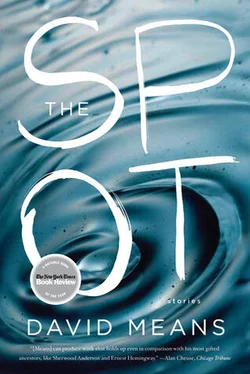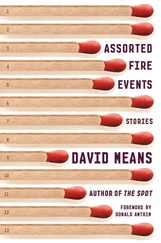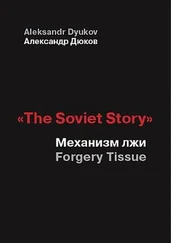I’d come to Lincoln Center some night, he said, when you’re with your husband, and watch you two listening to the symphony. I’d meet you at the fountain during the intermission and we’d steal away.
No, we’d meet just as we’re meeting now. Except it would go on forever. The story would end and then it would just keep going, the way this one does. That’s what it’s about. It would keep going onward, like the light from a star. We know they’re not going to find a way out, around it, and we know that they’re just going to continue until it ends.

But it doesn’t end, he said. He was on his back with his hand behind his head and the sun coming down through the bristle of his whiskers.
Around the edge of her voice when she was tense, or anxious, came the tightness of her Midwestern upbringing; she spoke one afternoon about her daughter. She’s, well, how should I say this? She’s kind of a troubled teenage kid. Maybe not much different than most. A little on the edge. Troubled is the only word I can find for it. I try never to say it because to say it is to make it so. But saying it to you seems safe enough.
The point where lust and love meet, where one ends and the other begins: the innate sincerity buried in the act of betrayal. The way it revealed the vestiges of her home to her, so that upon her return she saw everything, the pebbles in the driveway a buttermilk color, the old shingles smeared with moss, the clapboards lifting away from their nails, the yard wide and grand all the way down to the water’s edge, the light in her daughter’s room through the curtains. .
Dressing in the morning, snapping and adjusting undergarments, examining herself in the mirror with one hand on her belly, like Napoleon, lifting her skirt up her over her thighs, the single spritz of perfume around her belt line, all in the pale predawn light. With her mug of coffee at the kitchen sink, craning a bit to see if the traffic was heavy on the bridge: a chain of moving lights. She would cross it in a few minutes and go to the platform and wait, feeling a small soft pulse in her groin.
They stood together on the grating over the East River Drive, in the whoosh of updraft, and engaged in a long kiss while beside them the river gathered the last light of the Manhattan day. The kiss brought them as close to floating, as close to flying, as they’d ever get, and proved to be the most memorable moment, one that would remain with her for the rest of her life: the tangle of her hair around his face and lips, the touch of his fingers near the waistband of her skirt, while the cars passed beneath.
Using the excuse of work obligation, she came in on a Sunday, met him in the doorway of his building, and they walked to a service together. The reverend’s voice boomed past the microphone, reverberating hard against the stone, speaking about the elegance of grace, about the manner of forgiveness and the nature of redemption. He quoted from the book of Job:
The squares of the town forget them;
their name is no longer remembered;
so wickedness is broken like a tree .
On top of the flat pleats of her tweed skirt, tight against her spreading thighs, their hands rested, clasped firmly.

One year, from start to finish, the affair bent in a great arch, the first hints of lust building into the long lovemaking sessions at the apartment, twisting into the thick helix of obligation, the secretiveness of talk.
I want you to see the house, she said. I want you to know where I live, to get an idea. I want you to know a little bit about my life the way I know about yours. I’d like you to see my daughter. I want to kiss you on the riverbank, to implicate you into my existence. .
He rented a car, an old blue Ford — the kind of car a priest might drive — and drove across the bridge, turning up to the parkway as she had directed, exiting and following the river, crossing the town to her house, which stood up a drive — complacent-looking, just as she had described it, with its white clapboard and the lawn behind it stretching down to the water. He drove to the end of the road, to the park she had mentioned, and turned around and went past the house again. In his ribs was the clench of sadness. There was a light on in the upstairs window, behind a gauze of cotton, soft and yellowish. Her bedroom, he knew, was in the back and out of sight, facing the water.
He waited in the coffee shop for darkness to arrive, and emerged back into a soft fall evening. This time the house was silent and dark, and the car in the driveway was gone.

At the lookout off the Palisades Parkway, in her car, the lights of the Bronx a Milky Way of stars quivering in the Indian summer heat: Every year a kid falls from the Palisades here, she said, or leaps. I’ve talked to my daughter. . mouths kissing . . about it, about the dangers. . kissing, parting . . there is a reasonableness in her, there is something that still listens. .
As she left her office, the thin black skirt she wore was overcharged with static. She sprayed it and felt it lift away, but by the time she was back on the street it was recharged, clinging in wavelets to her thighs, riding along her crotch, sliding up with each step as she climbed the stairs to his apartment, where, in the wintry afternoon light, she stood before him and marched, letting the hem rise up and up her thighs until he was on his knees, clutching her waistband by the elastic.
There was the disrobing, the unveiling, the sublime exposure. The sunlight was low and cold; a bitter wind came in across Riverside. The heat in the pipes lurched and thumped, and from the steam valve there came a sputter, the sound of lips parting. He opened the window and she thought of her own house, leaking heat, the old plaster cold to the touch. It was that simple, in some ways, the wonder of the affair, the sense of lines that were drawn and redrawn: to have demarcations so clear and perfect, like lines on a map, not the regions and countries but the everlasting longitudes and latitudes; that part she retained when all else was gone.

He’s rather serious, she told a friend. Of course he has to be a bit serious, because he is studying theology. He speaks Hebrew and some Aramaic and is studying the Psalms. . but he’s funny, and not too serious, really, and you wouldn’t know from meeting him that he’s going to be a man of the cloth.
He’s funny, she told another friend. He’s lighthearted, with this nasal twang of a voice that somehow gets to me, you know, and he can turn phrases and do things that get inside me and make me feel alive.
The shame she felt came from the truth: she had been fucked and was fucking. The carnality of the affair was brutal and the main point. She wore the skirt again, electrified by the dry winter air, and let the static build as she walked along his street.
When you argue about your own story, she explained, well, that’s the end of things. As soon as we started to argue about our story, things fell apart for us.
When they tried to get God in, when he mentioned the idea of God nudging them together, the narrative, she would later think, immediately became banal and meek, rooted in the world. It was near the end. On a clear spring day the promenade urged them south. Beneath the wall that ran along Riverside Drive a man lay asleep on an old, splintered bench, his fat belly spilling from green work pants, a newspaper folded over his face. On the next bench sat another man wearing thick headphones, moving his head placidly in small rotations, as if working out an eternal kink in his neck. There was something unsettling about his deep absorption in music that could not be heard and that would never be heard.
Читать дальше













